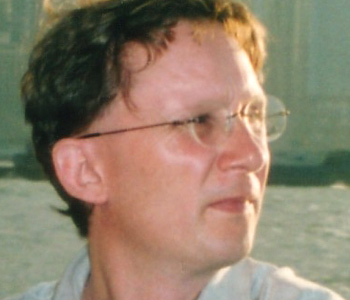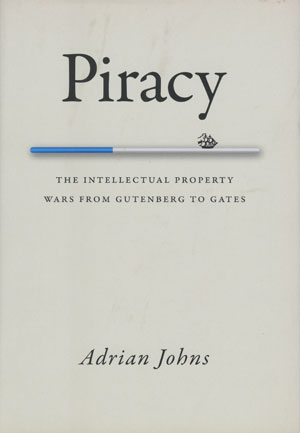
Piracy is about how today’s world of intellectual property came into being through half a millennium of conflict.
Beginning in early modern Europe, the book traces the emergence of the laws and customs that structure the information economy. The story it tells ranges from the streets of Milton’s London to the computer labs of MIT and the backstreets of Beijing.
I show how struggles over so-called piracy have consistently driven the development of new practices and concepts. The laws of copyright and patenting—and even the concept of intellectual property itself—resulted from such struggles. At the same time, the debates that piracy triggered also shaped major elements of modern culture—including the Enlightenment itself, science, and the media.
Piracy also traces the emergence of a private policing industry devoted to forestalling or detecting piracy—an industry that has itself repeatedly skirted illegality in its methods.
The book ends in the present day, with a speculation that the age of intellectual property may be coming to an end. The combination of a networked economy that challenges the basic foundations of intellectual property monopolies and a growing backlash against excessive anti-piracy policing may well lead to a revolution in this sphere as great as that which led to the invention of intellectual property itself.
At that point, the convictions and arguments that structured the prior half-millennium of the history of intellectual property will become “live” once again; understanding them may well help us to find a way forward. It is in that light that I would hope readers will approach Piracy: as history, certainly, but as history with consequences.
“Piracy also traces the emergence of a private policing industry devoted to forestalling or detecting piracy—an industry that has itself repeatedly skirted illegality in its methods.”
Piracy today is often presented as the definitive transgression of the information age. There are pirate movies and pirate music, obviously, but there are also pirate pharmaceuticals and seeds, pirate toys, and pirate aircraft parts. Anything that can be construed as information—and in this age that means anything at all—may be subject to pirating.
This means that controversies about piracy reveal the foundations of our age as few others can. In particular, they highlight a central problem: how to reconcile the realms of creative authorship and commercial life.
In Piracy I make the point that those controversies are not at all new. They have raged since the 1600s, taking different forms in different contexts but always forcing participants to articulate important principles on which creation and commerce might be allowed to intersect.
So, for example, in the eighteenth century metropolitan publishers fought against provincial and international “pirates” to preserve their claims to a perpetual “literary property” in printed works. Their clashes defined and publicized what became central concepts of the Enlightenment, and hence of the modern cultural economy: authorial rights, the rights and duties of readers, the authority of the public, and the need for a balance to be struck between monopoly and liberty—between openness and property—for the sake of progress.
In the nineteenth and twentieth centuries, similarly, the ideal of modern science as an objective, collective, and public endeavor took shape through a long series of clashes centering on alleged piracy of industrial research. The distinctive funding and publishing mechanisms on which today’s science depends emerged from those clashes, which climaxed in the 1930s and ’40s. In these ways and more, defining elements of our late-modern world reflect the history that Piracy reveals.
I came to this subject from working on the relation between the scientific revolution and the printing revolution. In the 1450s, the printing press was introduced to Western Europe by Johann Gutenberg. From about the same time, a massive transformation in knowledge about the natural world began that would culminate in Isaac Newton’s Mathematical Principles of Natural Philosophy in 1687 and ultimately in the creation of modern science.
The question I originally wanted to answer was this: how did printing and science, both being practical activities concerned with knowledge, affect each other in that revolutionary period?
The answer I came up with was quite unlike conventional views. The emphasis tended to be on the intrinsic power of the press to multiply identical copies of texts. But to me the character of “print culture” was much more ambiguous. The printers had generated their own customs and conventions, which were not necessarily conducive to stabilizing knowledge. And the scholars and experimenters had had to band together to make print into a useful tool for science. They created editorial techniques, new genres (the scientific journal and the experimental paper), new notions of authorship, and new reading strategies to do this.
This argument was laid out in The Nature of the Book: Print and Knowledge in the Making, which was published in 1998. It was in the course of writing The Nature of the Book that I became aware that in the early modern period accusations of piracy had originated and proliferated. That gave me the idea to pursue their history from that era to the present.
The common thread between The Nature of the Book and Piracy is that both look for answers about today’s major cultural questions—the identity and origin of science, the character of the media, the problems of the information economy—not in high concepts, but in the mundane, everyday commitments out of which such concepts must grow.
The focus is on the actual people, places, and practices that have shaped entities like intellectual property. So readers will find both books populated with real human beings, facing complex and intractable problems and doing their best to tackle them with the cultural, practical, and technical means at their disposal. I think that this is the essence of history; even the greatest issues of an age have to be comprehensible in such terms.
On page 343 one meets Frederick Willetts, the self-proclaimed Pirate King of Edwardian London. In the early years of the twentieth century, Willetts ran a “People’s Music Publishing Company” in East London that issued pirated popular music in millions of copies, distributing it across the country.
The music industry employed its own private army of “commandoes” to track him down, which they eventually succeeded in doing, but not before the industry had effectively ceased publishing songs in protest at his effects.
What is remarkable is that when Parliament launched an inquiry into pirated music, Willetts volunteered to come to Westminster and testify. This is, I think, the only time in history when a self-proclaimed pirate has shown up at a center of power and mounted an explicit, populist defense of piracy itself.
Willetts’s case bears examination, because many of the elements of later music pirates, including the digital ones, can be seen in embryo in his declarations. For example, he condemned the orthodox industry as monopolistic, hidebound, and dedicated to elite customers at the expense of the working class. And he proposed market segmentation as an appropriate way forward—another line that has been revived in recent years.
Willetts’s bravado gesture—which did him little good, incidentally, as he was jailed shortly after—exemplifies the point that major convictions of today can be traced back to controversies about piracy in previous decades. It throws unfamiliar light on the familiar, and encourages us to rethink our assumptions about what is permanent and what changeable. And Willetts himself exemplifies the kind of colorful personality that Piracy repeatedly finds at the heart of these controversies.
Piracy is really full of stories; this is but one favorite.
“The intellectual property wars need some historical insight if they are not to be waged interminably.”
I hope that the book will encourage protagonists in today’s intellectual-property debates to think more deeply and broadly than they usually do about what is at stake and how we might move forward.
Often very passionate, those debates take place on grounds of policy and law. That makes sense, of course. But it also means that present intellectual property debates leave untouched what are important, perhaps even essential, constituents of the issues at hand. That is, IP in practice is a matter of custom and convention as much as it is of law per se.
If we neglect that fact, our responses to what everyone agrees to be a crisis in the field are likely to be deficient, and quite possibly even damaging.
The upholders of ever-stronger IP protections in particular tend to make this mistake. Their arguments about the practical effects of such protections rest largely on political-economic theories and models.
We need profound engagement with how IP operates in practice. And a necessary part of that engagement must be an appreciation of how the nature and effects of intellectual property have changed over time. That is, the intellectual property wars need some historical insight if they are not to be waged interminably.
Piracy makes that argument. And it further shows that an historical understanding can suggest why our current disputes are so intractable.
By identifying the emergence of an “intellectual property defense industry” the book calls attention to a social and economic phenomenon that has gone largely unrecognized, but which in fact lies at the heart of the problem.


Adrian Johns is Professor of History and Chair of the Committee on Conceptual and Historical Studies of Science at the University of Chicago. Educated at the University of Cambridge, he also taught at CalTech and the University of California, San Diego. Besides the books featured in his Rorotoko interviews, Death of a Pirate and Piracy, he is also the author of The Nature of the Book: Print and Knowledge in the Making (1998).